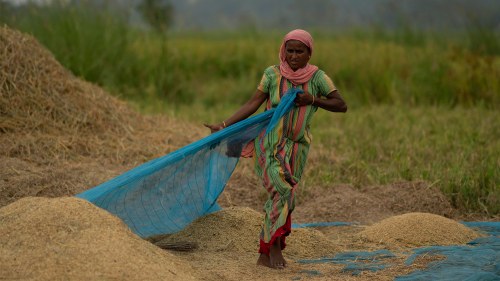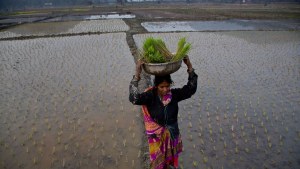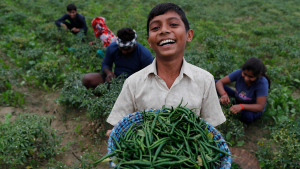Collision Course, High Tech Soil, and Pollinator Problem
Check out our roundup of the week's top news and research in food, agriculture, and global development.

Top Story
Hunger on World Food Day
October 16 marked 43 years since the first World Food Day, but hunger and food insecurity are still widespread, with an estimated 735 million people facing hunger in 2022. Progress continued consistently until 2015, but since then hunger levels have stayed the same or worsened due to the COVID-19 pandemic, the war in Ukraine, price volatility, and import dependency. Hunger remains unequally distributed, with low-income countries, rural communities, and women particularly vulnerable.
Council Insights
Collision Course
"Water is the bedrock of the food system on our planet. But the increasingly unstable balance between food and water security has been on vivid display this summer,” writes Nonresident Fellow Michael Tiboris. “Our food and water demands are on a collision course.” Read the full blog on our website.
 Food and Agriculture
Food and Agriculture
Food and Agriculture
Chemical Controversy
The European Union failed to reach an adequate majority agreement on reauthorizing the herbicide glyphosate for another 10 years. Agribusiness representatives have claimed that glyphosate, which is used in products like Roundup to kill weeds without harming crops, is integral to farmers’ operations and to protecting soil. Many civil society groups have raised concerns about glyphosate’s potential impacts on human health and on the environment, especially for biodiversity.
Fertilizer Shortage
The COVID-19 pandemic, war in Ukraine, and an increasingly valuable US dollar have caused fertilizer prices to double in countries like Nigeria, intensifying food insecurity and hunger. Simultaneously, anticipated adverse weather from the El Niño season is driving up demand for fertilizer. Some farmers are shifting to organic fertilizer practices, but it will take time to bring yields back to the pre-shortage levels achieved with commercial fertilizer.
Pollinator Problem
A new study found that climate change-induced temperature increases can lead to 61 percent reductions in insect pollinator populations. An estimated 35 percent of the world’s food crop, including coffee and chocolate, depends on pollinators for reproduction. Tropical areas, where insects are already near their temperature limits, are most at risk of crop loss.
Deeper Dive
The Cost of El Niño
A new study found that recent El Niño events caused $4 trillion in global economic losses. El Niño cycles affect agricultural production around the world, typically leading to increased precipitation and rain along the eastern Pacific and drought in southeast Asia. The study also found that, with climate change potentially affecting its frequency and strength, El Niño could cost the global economy $84 trillion by the end of the century.
Resilience
Aiding Ukraine
Japan plans to assist Ukraine in its economic recovery and resilience by providing intelligent farming technology. They aim to boost Ukraine's agricultural productivity using sensors and artificial intelligence to optimize water and fertilizer usage for crops like wheat and sunflowers. Japan's focus on non-military support demonstrates its commitment to helping Ukraine's reconstruction and resilience in the face of challenges posed by Russia's invasion.
DC Report
Sustainable Salmon
The US is experiencing a shift in salmon farming towards more sustainable land-based aquaculture, providing an eco-friendly alternative to traditional open net-pen systems. These farms offer a climate-stable solution to environmental concerns. Experts anticipate that land-raised fish will become a substantial part of the US salmon supply over the next two decades, ultimately reducing the carbon footprint associated with imported salmon.
Big Actors
Scrapping Subsidies
The World Bank's new president, Ajay Banga, raised concerns about the significant sums spent by governments on subsidizing fossil fuels and agricultural practices. Banga states that the $1.25 trillion allocated to these subsidies annually is excessive, especially considering the substantial environmental impact of these sectors, estimated at up to $6 trillion. The bank is now urging a shift in focus towards climate change action.
Big Ideas
High Tech Soil
The World Bank is partnering with the Office Chérifien des Phosphates to develop sustainable agriculture in West Africa and the Sahel. They will use digital soil mapping to give farmers greater access to fertilizers specially designed to nourish their soil and improve crop yields, while also launching a digital agriculture school program to build local capacity and entrepreneurship.
Ask an Expert
As countries enact export restrictions on food products, global food prices are starting to rise. What are possible long-term effects of these policies, and how might it affect food insecure populations?
“Food export restrictions are a tactic that countries will deploy to stabilize food prices and shield local consumers and small-scale farmers from market turbulence and dangerous inflation. Though controls like these can be effective for short durations in the implementing country, international consequences can be adverse and severe farther out. If restrictions are imposed by a major exporter—on rice exports in India, for example—shockwaves can impact the global rice market, triggering price rises for the poor in other nations and regions. The knock-on effects can be clear and devastating: if poor households, especially households with children, are forced to decrease the quantity or quality of their nutrition, or sell assets and cut expenditures on health or education, results can be grimly evident for years or decades after.”
—Nonresident Fellow Hope Michelson


Have a question about food and agriculture? Ask one of our experts at the Center on Global Food and Agriculture to get an answer in next week's Global Food for Thought!
Council Events
Did you miss one of our previous livestreams? Don't worry! They are all available on our website to watch at any time.
Other Upcoming Events
Achieving Gender Equality, Food Security, and Nutrition: Multi-Stakeholder Initiatives and Approaches
Date: October 24
Time: 7:30 a.m. ET
Food Systems Repercussions of the Russia-Ukraine War
Date: October 26
Time: 12:30 – 1:30 p.m. ET
The Political Economy of Food System Transformation: Pathways to Progress in a Polarized World
Date: November 14
Time: 12:50 – 1:50 p.m. ET
The Diverse Leaders in Climate and Agriculture Summit
Date: November 17 - 18
Tackling Obesity and Noncommunicable Diseases in Mexico: A Policy Approach
Date: November 21
Time: 9:00 – 10:30 a.m. ET
Land Acknowledgement Statement
The Center on Global Food and Agriculture recognizes it occupies the ancestral land of the Kiikaapoi, Peoria, Kaskaskia, Bodwéwadmi, and Myaamia people. Indigenous communities around the world disproportionately experience the pressures of climate change, global conflicts, and the COVID-19 pandemic, while simultaneously stewarding 80 percent of the world’s biodiversity. These Indigenous tribes and nations are the original owners of this land and continue to be systemically erased by policies and practices that ignore their histories. To learn more about Indigenous foodways and practices, check out our 2022 blog series "Stewardship, Sovereignty, and Solutions."






